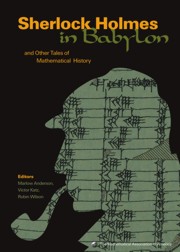Book contents
- Frontmatter
- Introduction
- Contents
- Ancient Mathematics
- Foreword
- Sherlock Holmes in Babylon
- Words and Pictures: New Light on Plimpton 322
- Mathematics, 600 B.C.–600 A.D.
- Diophantus of Alexandria
- Hypatia of Alexandria
- Hypatia and Her Mathematics
- The Evolution of Mathematics in Ancient China
- Liu Hui and the First Golden Age of Chinese Mathematics
- Number Systems of the North American Indians
- The Number System of the Mayas
- Before The Conquest
- Afterword
- Medieval and Renaissance Mathematics
- The Seventeenth Century
- The Eighteenth Century
- Index
- About the Editors
The Evolution of Mathematics in Ancient China
from Ancient Mathematics
- Frontmatter
- Introduction
- Contents
- Ancient Mathematics
- Foreword
- Sherlock Holmes in Babylon
- Words and Pictures: New Light on Plimpton 322
- Mathematics, 600 B.C.–600 A.D.
- Diophantus of Alexandria
- Hypatia of Alexandria
- Hypatia and Her Mathematics
- The Evolution of Mathematics in Ancient China
- Liu Hui and the First Golden Age of Chinese Mathematics
- Number Systems of the North American Indians
- The Number System of the Mayas
- Before The Conquest
- Afterword
- Medieval and Renaissance Mathematics
- The Seventeenth Century
- The Eighteenth Century
- Index
- About the Editors
Summary
A popular survey book on the development of mathematics has its text prefaced by the following remarks:
Only a few ancient civilizations, Egypt, Babylonia, India and China, possessed what may be called the rudiments of mathematics. The history of mathematics and indeed the history of western civilization begins with what occurred in the first of these civilizations. The role of India will emerge later, whereas that of China may be ignored because it was not extensive and moreover has no influence on the subsequent development of mathematics [1].
Even most contemporary works on the history of mathematics reinforce this impression, either by neglecting or depreciating Chinese contributions to the development of mathematics [2]. Whether by ignorance or design, such omissions limit the perspective one might obtain concerning both the evolution of mathematical ideas and the place of mathematics in early societies. In remedying this situation, western historians of mathematics may well take heed of Whittier's admonition [3]:
We lack but open eye and ear
To find the Orient's marvels here.
Language barriers may limit this quest for information; however, a search of English language sources will reveal that there are many “marvels” in Chinese mathematics to be considered.
Legend and fact
The origins of mathematical activity in early China are clouded by mysticism and legend. Mythological Emperor Yü is credited with receiving a divine gift from a Lo river tortoise.
- Type
- Chapter
- Information
- Sherlock Holmes in BabylonAnd Other Tales of Mathematical History, pp. 60 - 68Publisher: Mathematical Association of AmericaPrint publication year: 2003

